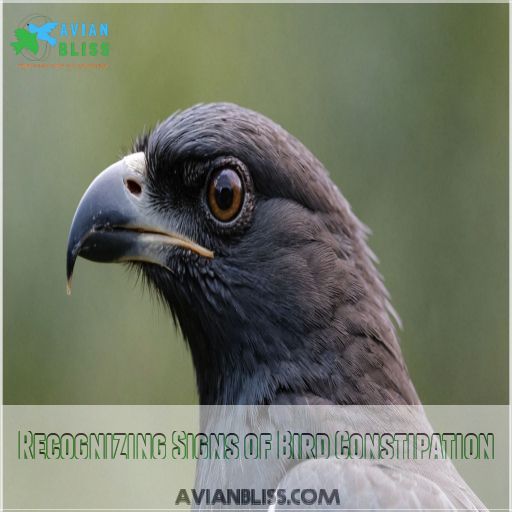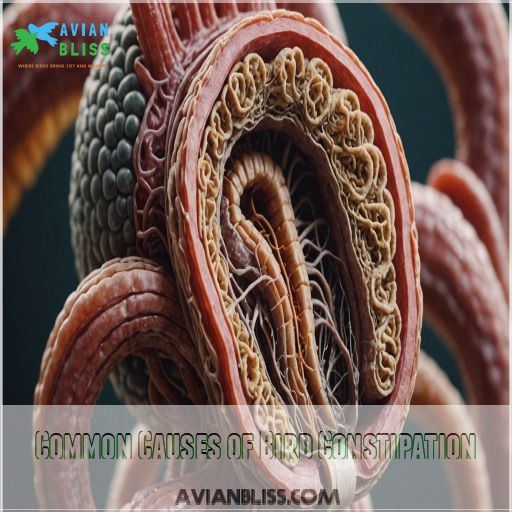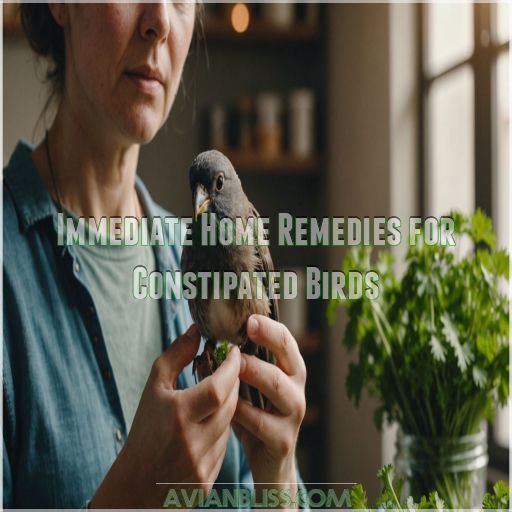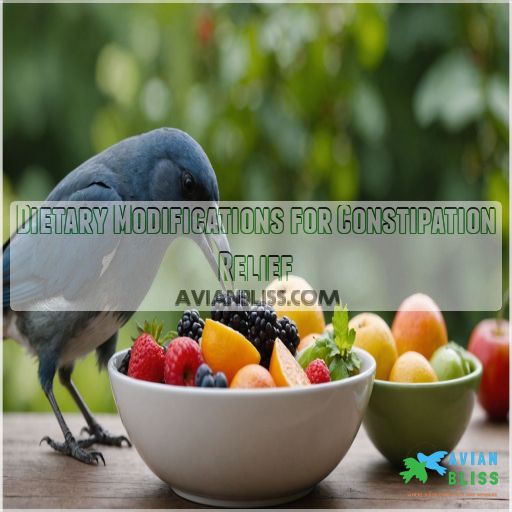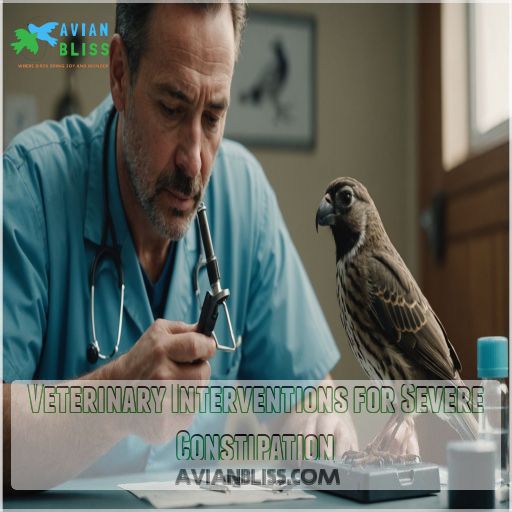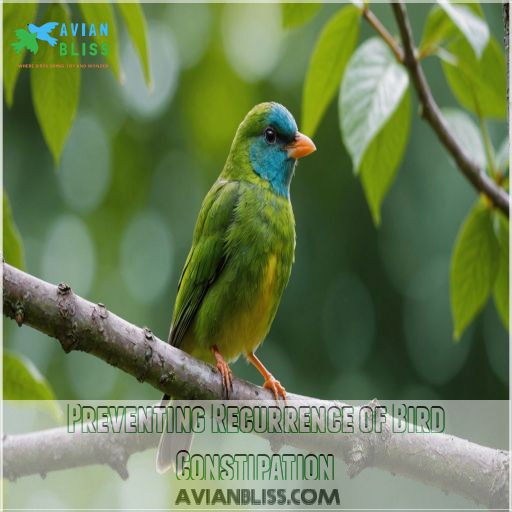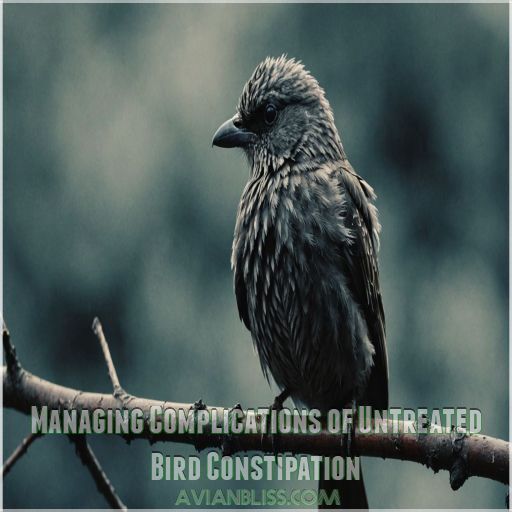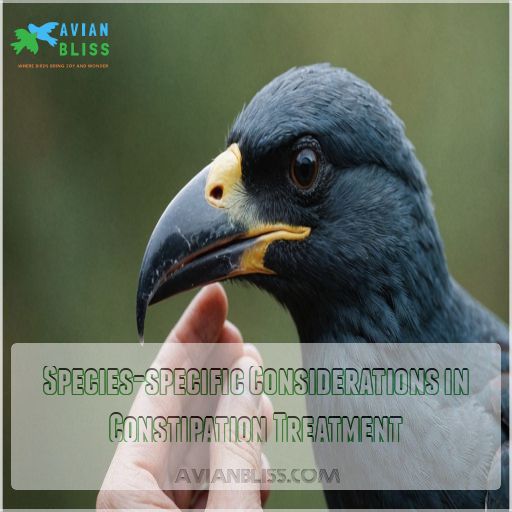This site is supported by our readers. We may earn a commission, at no cost to you, if you purchase through links.
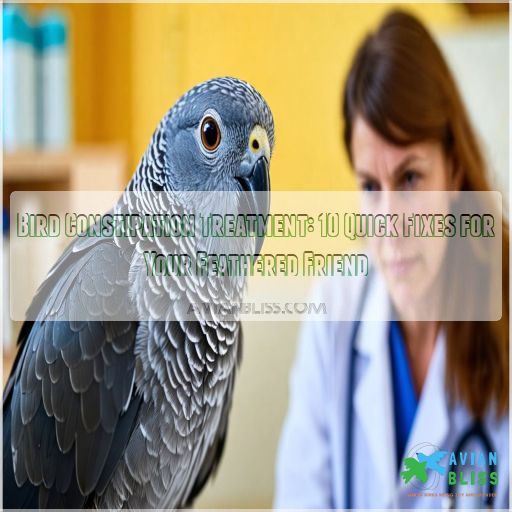 Dealing with bird constipation can be a head-scratcher, but don’t worry—there are solutions.
Dealing with bird constipation can be a head-scratcher, but don’t worry—there are solutions.
First, make sure your bird has plenty of fresh water throughout the day. Soaking and sprouting seeds can also help things move along. A warm bath can work wonders, or try giving a gentle belly rub with warm hands—think of it as a spa day.
Add some fiber-rich fruits like apples or berries to their diet. If your feathered friend’s still not feeling better, a visit to the vet might be needed.
Curious what else might help? Let’s uncover more tips in the rest of the article.
Table Of Contents
- Key Takeaways
- Recognizing Signs of Bird Constipation
- Common Causes of Bird Constipation
- Immediate Home Remedies for Constipated Birds
- Dietary Modifications for Constipation Relief
- Veterinary Interventions for Severe Constipation
- Preventing Recurrence of Bird Constipation
- Alternative Therapies for Bird Constipation Treatment
- Managing Complications of Untreated Bird Constipation
- Species-specific Considerations in Constipation Treatment
- Long-term Management of Prone-to-constipation Birds
- Frequently Asked Questions (FAQs)
- How to treat a constipated bird with warm water?
- What can I do to relieve constipation?
- How do you take care of a constipated bird?
- What do birds eat if they have constipation?
- What is a natural laxative for birds?
- What happens when a bird can’t poop?
- What to give a constipated cockatiel?
- What to give a constipated budgie?
- How long can a bird go without defecating?
- Can constipation lead to other health issues?
- What are the risks of self-medicating a constipated bird?
- How can I monitor my birds bowel movements?
- When should I seek professional help for constipation?
- Conclusion
Key Takeaways
- You’ve got to keep your bird hydrated, like offering them a cool drink on a hot day. It’s crucial for their digestive health, and trying different water sources can be a fun adventure.
- Fiber is your bird’s best friend! Mix up their menu with juicy fruits like apples and berries, while avoiding a seed-only diet. A balanced diet with fiber can help sweep constipation away.
- Regular exercise is a must! Encourage playtime and movement to keep things moving. Think of it as their daily workout routine that keeps both their body and bowel in shape.
- When in doubt, don’t hesitate to visit the vet. They’re like the Sherlock Holmes for your bird’s health, ready to solve any mystery when home remedies just don’t cut it.
Recognizing Signs of Bird Constipation
Spotting a constipated bird isn’t always a walk in the park, but knowing what to look for can save your feathered friend from discomfort.
Keep an eye out for changes in droppings, straining during bathroom breaks, and a grumpy bird with fluffed-up feathers – these could be your cues to step in and help.
These signs indicate that your bird is in distress and needs your assistance to alleviate its discomfort.
Lack of or Changes in Droppings
Your feathered friend’s droppings can tell you a lot about their health.
Keep an eagle eye on changes in dropping color, consistency, frequency, shape, and volume. Healthy parrot droppings should be like clockwork – about every 20-30 minutes.
If you notice fewer droppings or changes in their appearance, your bird might be constipated.
Remember, in terms of parrot health, you’re not just winging it – these poop clues are nature’s way of keeping you in the loop.
Straining During Defecation
Many birds, when constipated, put on quite a show in their attempt to "go." Watch for telltale signs of straining: your feathered friend might squat, fluff up, and appear to push with all its might. This uncomfortable dance often results in little to no poop, or droppings with unusual consistency.
In addition to these signs, it’s also essential to monitor your bird’s poop for changes in color, as green poop can sometimes indicate a health issue, such as a veggie-rich diet influence. If the green poop persists or is accompanied by other unusual characteristics, it may be a sign of an underlying problem.
If you notice your bird performing this potty pas de deux frequently, it’s time to consult your vet about potential vent blockages or other issues.
Reduced Appetite and Lethargy
While straining during defecation is a clear sign, keep an eye out for subtle changes in your feathered friend’s behavior.
A bird’s reduced appetite and lethargy can be telltale signs of constipation. These symptoms might sneak up on you, but they’re as important as a canary in a coal mine.
Watch for:
- Sudden disinterest in favorite treats
- Sleeping more than usual
- Weakness or reluctance to move
- Fluffed-up feathers, looking like a grumpy puffball
Abdominal Distension and Discomfort
When your feathered friend’s belly looks like a balloon, it’s time to play detective. Abdominal distension is a telltale sign of bird constipation.
Don’t let your birdie suffer in silence – keep an eye out for these symptoms:
| Symptom | Action |
|---|---|
| Bloated tummy | Gentle massage |
| Visible discomfort | Warm water soak |
| Reduced movement | Encourage exercise |
| Changes in droppings | Adjust diet |
Remember, a happy bird is a regular bird. If symptoms persist, consult your vet for specific treatment options.
Fluffed-up Feathers and Irritability
Your bird’s feathers tell a tale. Fluffed-up plumage isn’t just a fashion statement—it’s a cry for help.
Notice your feathered friend looking like a puffball and snapping at you? They might be dealing with more than a bad hair day. Stress, diet changes, or underlying illness could be ruffling their feathers.
Keep an eye out for lethargy and inappetence too. Your birdie’s comfort is the name of the game!
Common Causes of Bird Constipation
Ever wondered why your feathered friend’s plumbing gets backed up?
From dehydration to a lack of fiber, there’s a whole menu of reasons your bird might be struggling in the bathroom department.
Dehydration and Inadequate Water Intake
Dehydration can turn your feathered friend’s plumbing into a desert! Just like us, birds need plenty of water to keep things flowing smoothly.
Here’s how to spot and solve the problem:
- Check for sunken eyes or dry, wrinkled skin
- Offer fresh water in various bowl types
- Try a bird fountain for picky drinkers
- Incorporate water-rich foods like melon or cucumber
Remember, proper hydration is the key to a happy, healthy birdie!
Fiber-deficient Diet
A fiber-deficient diet can leave your feathered friend feeling backed up, especially if they’re not getting enough chia seeds
. Just like us, birds need their daily roughage.
A nutritionally sound base diet is essential for a bird’s health and longevity, and a balanced mix of pellets, fruits, and veggies can help provide that Balanced Diet for Birds.
Swap out those all-seed buffets for a mix that includes low-GI options like apples and pears. Think of it as giving your bird’s digestive system a broom to sweep things along.
Introduce fiber-rich foods gradually to avoid ruffling any feathers. Your bird’s tummy will thank you, and you’ll both be singing a happy tune.
Lack of Exercise and Physical Activity
A sedentary lifestyle can turn your feathered friend’s digestive system into a slow-motion rollercoaster. Insufficient exercise leads to weak abdominal muscles, essential for regular bowel movements.
Don’t let your bird become a couch potato! Make sure ample flight time, provide enrichment toys, and create an exercise routine.
A spacious cage and interactive play sessions will keep your bird active, reducing the risk of constipation and promoting overall health.
Remember, a busy bird is a happy bird!
Ingestion of Foreign Objects
Birds aren’t just couch potatoes; they can be mischievous explorers too!
While exercise is essential, sometimes your feathered friend’s curiosity leads to trouble. Ingesting foreign objects is like a bird’s version of "I dare you to eat that!"
These little troublemakers might swallow anything from toy parts to cage substrate.
Keep a keen eye out for sudden changes in droppings or behavior. If you suspect your bird’s pulled a Houdini with an inedible object, don’t wing it – consult your vet pronto, to prevent any serious health issue and ensure a swift recovery.
Underlying Medical Conditions
Sometimes, the root of the problem lies deeper than meets the eye.
Underlying medical conditions can throw a wrench in your feathered friend’s digestive works. Gastroenteritis, for instance, can lead to constipation.
Don’t let these issues ruffle your feathers! An avian vet can diagnose and treat bird illnesses, offering a specific prognosis, especially when it comes to salt poisoning
.
Remember, catching these health hiccups early is key to keeping your birdie’s plumbing in tip-top shape.
Immediate Home Remedies for Constipated Birds
When your feathered friend’s feeling backed up, quick action can make all the difference.
Let’s explore some easy home remedies you can try right away to help your constipated bird get back to its chirpy self.
Warm Water Soaking Technique
When your feathered friend’s feeling backed up, it’s time for a spa day.
Fill a shallow bowl with lukewarm water – not too hot, you’re not making bird soup!
Gently place your birdie’s lower half in for a 15-30 minute soak . This warm bath will help loosen things up and get things moving again.
Keep a close eye on your bird’s reaction, and be ready with a towel for drying off afterward, a time for a gentle dry.
Increasing Hydration Methods
Now that you’ve warmed up your feathered friend, let’s turn on the waterworks! Keeping your bird hydrated is like giving them a mini spa day.
You’ll want to offer a variety of water sources to tempt even the pickiest drinkers. Here are some bird-approved hydration stations:
- Misting: Give your bird a cool shower with a gentle spray bottle
- Fruit feast: Offer juicy treats like watermelon or grapes for a tasty hydration boost
- Syringe sipping: For reluctant drinkers, try offering water via a small syringe
These methods will have your parrot feeling like they’re sipping piña coladas on a tropical beach in no time
Dietary Fiber Boost
Everyone knows a happy bird is a regular bird! To give your feathered friend’s digestion a boost, let’s talk fiber. You’ll want to gradually increase your bird’s fiber intake to 20-40 g/day over ten days. This gentle approach will help avoid any tummy troubles.
| Food | Fiber Content | Bird’s Reaction |
|---|---|---|
| Psyllium | High | "Smooth moves!" |
| Wheat bran | Moderate | "Feeling lighter!" |
| Plums | Good | "Prune power!" |
| Fresh veggies | Varied | "Crunchy goodness!" |
Pellets provide essential nutrients and prevent picky eating habits, so consider making them 50-70% of your bird’s daily intake with a healthy diet for pet birds. A balanced diet approach like the 40-30-20-10 rule, which involves mixing bird food pellets and fresh options, can help prevent digestive issues. Remember, fiber-rich foods are your bird’s best friend for beating constipation. Mix things up with a variety of sources to keep your pet chirping happily!
Gentle Abdominal Massage
Your feathered friend‘s tummy troubles might need a helping hand. While dietary fiber’s great, sometimes a gentle belly rub can work wonders.
Here’s how to give your birdie a spa-like massage:
- Warm your hands to avoid startling your pet
- Use light, circular motions on the lower abdomen
- Massage for 1-2 minutes, twice daily
Remember, a happy bird is a regular bird! If symptoms persist, don’t wing it – consult your vet.
Encouraging Physical Activity
A sluggish bird is like a stalled engine – it needs to get moving!
Encourage your feathered friend to stretch those wings. Upgrade to a larger cage for more flight time, or create an obstacle course with safe toys.
Playtime ideas? Try hide-and-seek with treats or set up a birdie gym.
Regular exercise routines can help prevent constipation and keep those hind feathers fluffed with joy.
Dietary Modifications for Constipation Relief
Your bird’s diet can make or break its digestive health, so it’s time to shake things up on the menu.
With a few smart tweaks to your feathered friend’s meals, you’ll help get things moving and say goodbye to those constipation blues.
Fiber-rich Fruits and Vegetables
Fiber-rich fruits and veggies are nature’s little plumbers for your feathered friend’s digestive system.
Apples, pears, and berries are top choices to keep things moving smoothly. Chop these goodies into bite-sized pieces to prevent any choking hazards.
Remember, moderation is key – think of these as treats rather than staples.
Seasonal options like pumpkin or sweet potatoes can add variety to your bird’s diet while promoting healthy digestion .
Soaked and Sprouted Seeds
Seeds can be a bird’s best friend for constipation relief. Soaking and sprouting make seeds a nutritional powerhouse, making them easier to digest and boosting hydration, which can also help counteract excessive water intake that may lead to watery droppings issues. It’s like giving your feathered pal a gut-friendly makeover!
Additionally, a balanced mix of seeds, pellets, and moderate fruit portions can help prevent digestive issues. Soaking and sprouting can make seeds easier to digest, which is especially helpful for birds prone to stress-induced digestive problems.
Try soaking sunflower seeds, seeds, or millet overnight. Rinse them well, then offer them to your bird. You’ll be amazed at how these little gems can help keep things moving smoothly in your bird’s digestive tract.
Probiotic-enriched Foods
Introducing probiotic-enriched foods to your feathered friend’s diet can work wonders for their gut health, much like the benefits of quinoa for birds
.
These tiny bacterial superheroes fight constipation and boost immunity (Source). Try adding a dollop of yogurt or kefir to their meal – it’s like a spa day for their digestive system.
For a DIY treat, whip up some fermented veggies. Just remember, a little goes a long way. Your bird’s tummy will be doing backflips of joy!
Hydrating Food Options
Quench your feathered friend’s thirst with nature’s juicy treats!
Offer water-rich fruits like melons and berries to combat constipation. Veggies aren’t just for humans – cucumber slices and lettuce leaves can be bird-friendly hydration stations.
Don’t forget to soak those seeds; they’ll plump up like tiny sponges, adding moisture to your bird’s diet.
Remember, a well-hydrated birdie is a happy, regular birdie!
Balanced Nutrient Intake
Now that you’ve got your feathered friend sipping smart, let’s talk about feeding them right.
A balanced diet is like a nutritional symphony for your bird.
Mix up their menu with a variety of nutrient-rich foods . Think of it as creating a tasty playlist – pelleted diets as the main track, with fresh fruits and veggies as catchy interludes.
Don’t forget to sprinkle in some probiotics and digestive enzymes for that extra digestive oomph!
Veterinary Interventions for Severe Constipation
When your feathered friend’s constipation won’t budge, it’s time to call in the pros.
A vet can pull out all the stops, from fancy tests to meds and even surgery if needed, to get your bird’s plumbing back on track.
Diagnostic Procedures
When your feathered friend’s still struggling after dietary tweaks, it’s time to call in the pros.
Your vet’s got a bag of tricks to pinpoint the problem. They’ll start with a physical examination, feeling your bird’s belly like a gentle massage.
X-ray analysis might reveal any blockages, while fecal analysis can uncover hidden parasites or infections.
Blood tests check for underlying health issues, and in some cases, an endoscopic examination might be necessary to get the full picture.
They will be able to provide a proper diagnosis and help your bird recover from their underlying health issues .
Medication Options
Your parrot vet might prescribe medications to get your feathered friend’s digestion back on track. These meds can range from over-the-counter solutions to prescription-strength antibiotics, depending on the severity of your bird’s constipation or gastroenteritis.
Remember, dosage is key – too little won’t help, and too much could ruffle your bird’s feathers in all the wrong ways!
- A tiny syringe filled with bright pink liquid medicine
- A worried parrot eyeing a pill hidden in a slice of apple
- A vet gently massaging a bird’s belly after giving medication
- A relieved owner watching their parrot perk up post-treatment
Fluid Therapy Techniques
Giving your constipated feathered friend fluids can feel like uncharted territory. Don’t worry, though! Here’s a simple guide to fluid therapy techniques that will have your pet chirping again in no time.
| Technique | Application | Benefits |
|---|---|---|
| IV Administration | Direct vein injection | Rapid hydration |
| Subcutaneous Fluids | Under-skin injection | Gradual absorption |
| Oral Hydration | Beak-fed liquids | Gentle rehydration |
| Fluid Monitoring | Regular checks | Prevents overhydration |
| Electrolyte Balance | Customized solutions | Restores essential minerals |
These methods can help combat lethargy and boost activity, getting your bird back to its perky self [Citation:1].
Surgical Interventions for Blockages
Going under the knife might sound scary, but sometimes it’s the best fix for your feathered friend’s stubborn blockage. Don’t worry, though – vets are pros at handling parrot obstructions.
Here’s what you need to know:
- Surgical risks: Anesthesia and infection are possible, but rare with experienced avian vets.
- Recovery time: Expect 10-14 days of rest and TLC.
- Cost factors: Prices vary, but it’s an investment in your bird’s health.
Remember, a happy bird means consistent poop and lively activity!
Post-treatment Care and Monitoring
After your bird’s treatment, it’s time to play nurse!
Keep a keen eye on their dropping frequency and consistency – it’s like reading tea leaves, but messier. Monitor their weight and behavior closely, adjusting their diet as needed.
Hydration is key, so make sure they’re sipping regularly. Incorporate probiotics and digestive enzymes to boost their gut health.
A happy tummy means a chirpy birdie! This is a good sign that your bird is recovering well.
Schedule follow-up vet visits to keep your feathered friend on the right track.
Preventing Recurrence of Bird Constipation
You’ve helped your feathered friend through a tough bout of constipation, but now it’s time to keep those droppings flowing smoothly.
Let’s explore some simple yet effective strategies to prevent your bird from getting backed up again, ensuring your pet stays happy, healthy, and regular as clockwork, with a particular focus on maintaining a consistent and smooth digestive system, which is often described as being as clockwork, similar to birds maintaining ecological balance through pest control, birds natural pest control
.
Optimizing Daily Water Intake
While veterinary care can save the day, keeping your feathered friend well-hydrated is key to preventing future constipation woes. You’ll want to become a water sommelier for your bird, offering a variety of hydration options to tickle their fancy. Remember, a well-watered bird is a happy bird!
Here’s your birdie hydration cheat sheet:
- Place water bowls strategically around the cage, like a treasure hunt
- Offer a bird bath for splashy fun and sneaky sips
- Try a gentle mist spray – it’s like a cool rain shower!
- Experiment with different water temperatures – some birds prefer it lukewarm
- Add a drop of fruit juice for a tasty twist (but don’t overdo it!)
Balanced Diet Planning
How can you keep your feathered friend’s digestive system humming like a well-oiled machine? Start by crafting a balanced diet plan.
Mix fiber-rich foods with seed mixes to keep things moving smoothly. Toss in fresh fruits and a variety of veggies to add flavor and nutrition.
Don’t forget to maintain proper water intake – it’s the secret sauce for preventing bird constipation.
Remember, a happy gut means a happy bird!
Regular Exercise Routines
Now that you’ve got your bird’s diet in check, let’s get those feathers moving!
Regular exercise is like a natural laxative for your feathered friend. It keeps their digestive system humming and helps prevent egg binding and dystocia.
Mix up their routine with different playtime ideas and exercise toys. Remember, a bird that’s moving is a bird that’s grooving – and pooping!
Just 15 minutes of daily activity can work wonders for your bird’s gut health.
Environmental Enrichment Strategies
Let’s jazz up your bird’s digs to keep constipation at bay! A well-designed cage is like a feathered paradise .
Mix things up with rotating toys – it’s like redecorating for your avian pal. Encourage foraging by hiding treats in puzzles or crumpled paper.
Social butterflies need interaction, so chat with your birdie or introduce safe bird buddies. These mental gymnastics will keep your feathered friend’s gut moving and grooving with some mental gymnastics and rotating toys!
Stress Reduction Techniques
A stressed bird is like a wound-up spring, ready to snap!
To keep your feathered friend cool as a cucumber and avoid constipation, try these stress-busting techniques:
- Create a zen zone with quiet time and soothing music
- Spice up their cage with new toys for mental stimulation
- Shower them with positive reinforcement during social interactions
- Provide a warm water bath to help them unwind
Remember, a relaxed parrot is a happy, healthy parrot!
Alternative Therapies for Bird Constipation Treatment
When your feathered friend’s plumbing is backed up, you might want to try some out-of-the-box solutions.
From herbal remedies to acupressure, alternative therapies can offer gentle relief for your constipated bird.
Without ruffling too many feathers, these treatments can provide a solution.
Herbal Remedies and Supplements
Nature’s pharmacy offers a feathered fix for your constipated companion.
Herbal remedies like yarrow and lavender have shown promise in boosting bird health. You’ll want to tread carefully, though. While these botanical buddies can work wonders, it’s key to consult your vet about safety concerns and dosage guidelines.
Remember, even natural supplements can ruffle feathers if not used correctly.
Warm water soaks and calcium-rich treats might be your first line of defense against those stubborn hind feathers.
Acupuncture and Acupressure
Help your bird’s digestive system work better with the gentle power of acupuncture and acupressure. These ancient techniques can work wonders for your feathered friend’s constipation.
Find a qualified bird acupuncturist to target specific points that stimulate bowel movements.
You can also learn simple acupressure techniques to use at home. Gently massage your bird’s abdomen in circular motions, mimicking the path of digestion, and remember that patience is key.
Your bird might need a few sessions to see results, making a few sessions necessary for optimal outcome.
Homeopathic Treatments
Homeopathic treatments offer a gentle approach to easing your bird’s constipation.
While research on their efficacy is limited, some bird owners swear by remedies like anise or fennel tea. These can potentially help with digestive discomfort and promote regular bowel movements.
Remember, bird safety comes first – always consult your vet before trying any new treatment.
It’s like finding the right key to open up your feathered friend’s comfort – sometimes a natural solution fits just right.
Light Therapy
With the power of light, you can brighten your bird’s day and help ease its constipation.
Light therapy isn’t just for humans – it can work wonders for your feathered friend too.
Set up a full-spectrum lamp (2,500-5,000 lux) about a meter from your bird for a couple hours each morning.
This can help regulate their circadian rhythm, potentially improving digestion and overall well-being.
Just remember, safety first – always supervise your bird during light therapy sessions.
Aromatherapy for Stress Reduction
Essential oils can be a great tool for stress relief for your bird.
Lavender’s calming scent might help your parrot unruffle its feathers.
But don’t wing it – safety’s paramount. Use a diffuser away from your bird’s cage and make sure there’s proper ventilation.
Start with just a drop or two. You’ll be singing a happy tune when you see your bird’s relaxed behavior.
Remember, a stress-free bird is less likely to experience constipation issues.
Managing Complications of Untreated Bird Constipation
If you’ve noticed your feathered friend struggling with constipation, don’t wait to take action.
Untreated bird constipation can lead to serious complications like cloacal impaction and organ damage, so it’s essential to address the issue promptly and effectively.
Cloacal Impaction
Cloacal impaction is no joke for your feathered friend. It’s like a traffic jam in your bird’s plumbing! This blockage can happen when urates build up, causing a world of trouble.
Keep an eye on your parrot’s hind feathers and droppings. If you notice straining or lack of poop, it’s time to act fast.
A warm water soak can help, but don’t hesitate to call the vet if things don’t improve quickly.
Bacterial Infections
A bacterial infection can turn your bird’s constipation from bad to worse. Like a fox in the henhouse, these unwelcome guests wreak havoc on your feathered friend’s gut health. Don’t let your parrot whimper in pain!
Here’s what you need to know:
- Symptoms include bloody diarrhea and fever
- Antibiotics may be necessary for treatment
- Warm water soaks can help soothe discomfort
- Different parrot species may show varying symptoms
- Prevention is key – maintain a clean environment
Stay vigilant and act quickly to keep your bird’s tummy happy and healthy!
Nutritional Deficiencies
Nutritional deficiencies can be a real pain in the tail feathers for your constipated bird.
Your feathered friend needs a balanced diet to keep things moving smoothly. Boost their intake of fiber-rich foods and make sure they’re getting enough vitamin A, calcium, and protein.
Think of it like tuning up your parrot’s engine – the right fuel mix keeps everything running smoothly.
Don’t forget to let your bird soak up some sunlight for that all-important vitamin D production.
Organ Damage
Long-term constipation can wreak havoc on your feathered friend’s insides. Think of it like a domino effect: when the digestive system’s backed up, it can put pressure on other organs.
Your bird’s liver health, kidney function, and even heart could take a hit. It’s like a traffic jam in their tiny body.
Don’t let things get this far – address constipation early to keep your bird’s organs singing a happy tune.
Behavioral Changes
Grappling with constipation, your feathered friend might turn into a real drama queen.
Watch out for these behavioral changes that scream "I’m not feeling fly":
- Stress-induced feather plucking, turning your bird into a fashionably challenged diva – a sign that they’re struggling with their mental well-being, which is closely linked to their behavior. Providing a positive reinforcement approach can help ease their stress.
- Sudden aggression, turning your sweet birdie into a tiny, feathered Hulk.
- Bizarre sleep patterns, like midnight dance parties or daytime power naps.
- Unusual vocalizations, from operatic squawks to grumpy mumbles.
Don’t let your bird suffer in silence. These signs are your cue to swoop in and save the day!
Species-specific Considerations in Constipation Treatment
You’ll need to tailor your approach when treating constipation in different bird species, as what works for a parrot mightn’t be ideal for a finch.
From diet adjustments to handling techniques, understanding your feathered friend’s unique needs is key to getting things moving again, which will depend on your feathered friend’s unique needs.
Parrots and Psittacines
If you’re caring for parrots and psittacines, they need special attention.
These clever birds can be drama queens about their digestive woes! Boost their parrot-specific diets with fiber-rich fruits and veggies.
Keep an eye on their psittacine behavior – any changes could signal trouble. For stubborn cases, consider warm water soaks or gentle massages.
Remember, prevention is key, so keep them hydrated and active to avoid future tummy troubles.
Finches and Canaries
Finches and canaries need special care to avoid constipation.
These little songbirds thrive on a varied finch diet, including a balanced seed mix and fresh veggies.
Keep their cage setup clean and spacious to encourage movement.
If you notice tail-twitching or straining, it’s time to act fast! A drop of canola oil on the vent can work wonders.
Remember, a happy bird is a regular bird!
Doves and Pigeons
Switching from finches to doves and pigeons, you’ll find these urban birds can be quirky eaters.
A pigeon diet rich in variety helps prevent dove constipation. Add chopped greens like spinach to keep things moving.
Make sure they’re hydrated, especially if nesting or staying indoors.
Watching their flight patterns for any change can also signal digestive issues.
Birds of Prey
As you tackle constipation in birds of prey, remember their unique needs.
Raptor diets high in fiber, along with proper hydration, can keep things moving. Regular small meals mimic prey capture and maintain healthy digestion.
Encourage exercise to match natural flight patterns. Prioritize nesting habits and conservation efforts—after all, a stressed bird is more prone to digestive issues.
Aquatic and Wading Birds
Your aquatic and wading birds, much like precise hunters of prey, need special care for healthy tummies.
An aquatic bird diet rich in fiber supports digestion, and bird-safe water sources prevent dehydration.
In a wading bird habitat, provide ample swimming space—perfect for constipation prevention in active chicks.
Keep your feathered friends swimming smoothly, like ducks off a water’s back, allowing them to truly be active chicks.
Long-term Management of Prone-to-constipation Birds
Dealing with a constipated bird can be an ongoing challenge, but don’t worry – we’ve got your back.
To keep your feathered friend regular, focus on regular vet check-ups.
Customized diets, and creating the perfect living environment.
Regular Health Check-ups
Imagine your bird’s health like a well-oiled machine. Regular health check-ups keep things running smoothly.
Preventative care involves:
- Scheduling avian vet visits for a thorough look-over.
- Ensuring routine screenings to catch issues early.
- Tracking health history for changes.
- Practicing early detection like a pro.
These steps will help your feathered friend feel tip-top!
Customized Nutrition Plans
Speaking of regular health check-ups, crafting a customized nutrition plan is like tailoring a suit for your bird.
It involves bird-specific diets, balancing seed vs. pellets, and adding nutritional supplements.
Keep an eye on food preparation and practice dietary monitoring.
Remember, a little tweak here and there can keep those feathers fluffed, not stuffed!
Environmental Modifications
Tweak your bird’s environment to keep constipation at bay. A larger cage offers more room for exercise, essential for good digestion.
Perches of various types promote movement, while maintaining a good temperature and humidity level discourages sluggishness.
Additionally, a clean environment is key to prevent the spread of viral infections, such as Avian Influenza Virus through contaminated droppings.
Don’t forget lighting! Natural light cycles can help regulate their biological clock, keeping everything moving smoothly—including their bowels.
Owner Education and Training
Training yourself is just as important as modifying your bird’s surroundings. Knowledge is power, and understanding bird constipation prevention can save stress down the line. Attend a workshop or grab a trusty bird care book. Share tips with fellow bird owners—learning together helps everyone fly right!
- Connect with bird care communities.
- Invest in educational resources.
- Schedule regular vet visits.
Monitoring and Record Keeping
To keep your feathered friend in tip-top shape, start by monitoring dropping frequency and poop consistency—even superheroes have daily check-ins.
Track color changes, weight shifts, and any personality quirks that might fly under your radar.
Maintaining a record is like holding a crystal ball for your bird’s health. It’s not obsessive; it’s just savvy bird parenting!
Frequently Asked Questions (FAQs)
How to treat a constipated bird with warm water?
You’re tackling a bird’s tummy troubles?
Gently use warm water and a soft cloth to clean the vent area.
Soak them to stimulate movement, but if nothing changes, consult a vet for proper guidance.
What can I do to relieve constipation?
Start by upping your fiber intake and staying hydrated with plenty of water.
Add some prunes or kiwi to your diet, and try mild exercise to get things moving.
If needed, use gentle laxatives sparingly (Source).
How do you take care of a constipated bird?
Imagine your parrot can’t poop—it’s no laughing matter!
Gently clean its vent with warm water and a soft cloth, then offer a few drops of vegetable oil with an eye dropper.
Always keep fresh water available.
What do birds eat if they have constipation?
To help a constipated bird, offer seeds rich in oil and fat, juicy fruits full of fiber and vitamins, and always provide fresh water.
It’s like giving a spa day to their digestive system.
What is a natural laxative for birds?
Aloe Vera is a great natural laxative for birds.
Simply make a gel juice from the leaf and mix it with water.
Offer this to your bird daily; it helps regulate digestion effortlessly (Source).
What happens when a bird can’t poop?
When your bird can’t poop, it may become inactive and irritable, fluff its feathers, and strain trying to defecate.
This isn’t just a bad day.
It’s a serious health concern needing prompt attention and care.
What to give a constipated cockatiel?
Every bird has its day, and for a constipated cockatiel, fresh veggies or fruits can work wonders.
Make sure they always have access to water, and consider adding a few drops of mineral oil as a natural remedy.
What to give a constipated budgie?
Consider giving your constipated budgie a few drops of Metamucil mixed with juice or water to help ease things along.
Make sure it stays hydrated, and offer veggies rich in fiber to aid digestion.
How long can a bird go without defecating?
Birds aren’t typically shy about bathroom breaks, but if your feathered friend hasn’t pooped in a day, it’s time to act.
Aim for a vet visit if there’s no progress by day two.
Can constipation lead to other health issues?
Constipation can lead to other problems like stomach pain, bloating, and loss of appetite.
In severe cases, it might cause rectal prolapse or impaction, which is when stool gets stuck and can’t be passed easily.
What are the risks of self-medicating a constipated bird?
Over 80% of bird flu cases in humans arise from close contact with birds .
Self-medicating a constipated bird risks misdiagnosis or worsening health, potentially exposing you to pathogens.
Always consult a vet for accurate treatment and guidance.
How can I monitor my birds bowel movements?
Keep an eye on your bird’s droppings by checking for changes in color, consistency, and frequency.
Log observations daily, and if anything seems unusual or off-color, a trip to the vet might be wise.
When should I seek professional help for constipation?
If you’re struggling with constipation, don’t wait until you’re feeling like a stuffed teddy bear.
Check with a professional if you’ve tried home remedies with no success, or if you notice severe pain and unusual symptoms.
Conclusion
Picture your bird soaring happily as you wave goodbye to constipation troubles!
With these quick fixes, your feathered companion will stay healthy and content. From hydrating better to adding fiber-rich goodies, you’ve got the tools to tackle bird constipation treatment effectively.
Remember, keeping a watchful eye on their symptoms and habits helps, and don’t hesitate to contact the vet if needed. You’re now equipped to make sure your bird’s well-being is always flying high!

